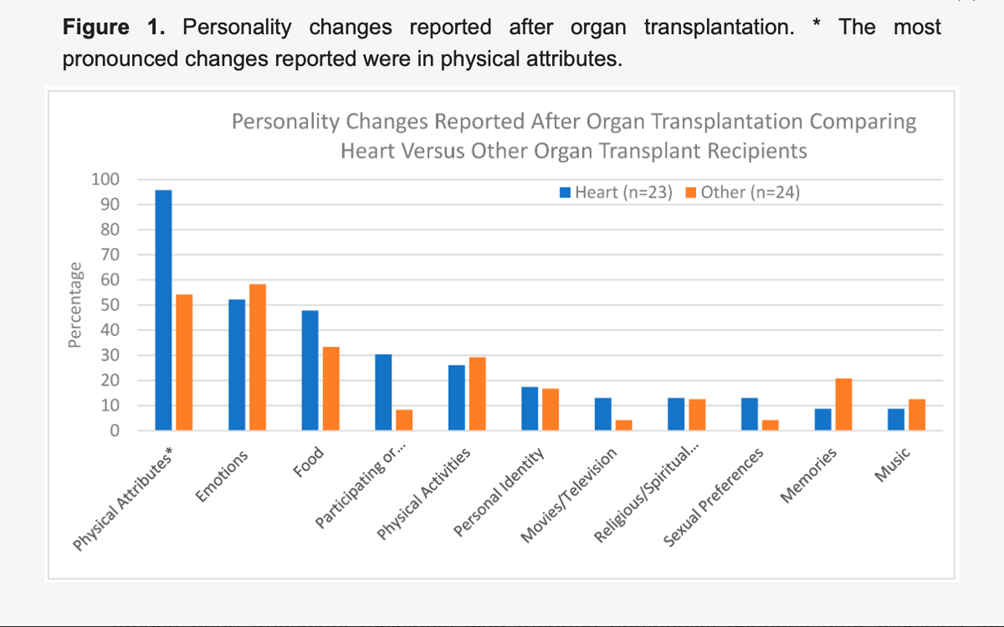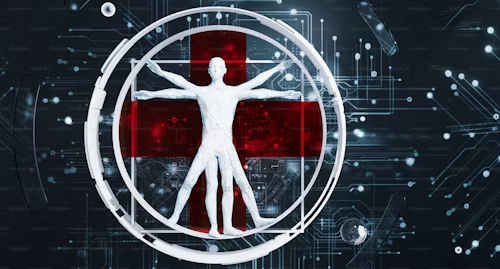Every so often you find a study that breaks new ground and advances human understanding.
The journal Transplantology has published a paper entitled “Personality Changes Associated with Organ Transplants” which documents the experiences of individuals who received a range of donated organs including hearts, kidneys, liver, and lungs.
It is well known that heart transplant recipients can experience consequent personality changes. Notably, this study shows that the same is true following other types of organ transplants. Here is a summary of the range of changes observed in the 47 study subjects broken down by heart transplant patients versus other organ recipients.

In all, 87% of subjects experienced marked unusual changes that challenged their behaviour, sense of identity and personal preferences. First person reports and evidence from donor families confirms that some of these effects involve the transfer of personality traits such as food or behavioural preferences from the donor to the organ recipient. For example, an avid meat eater might become a vegetarian who cannot face meat on their plate.
This is an unexpected result which challenges conventional ideas. This study points to the distributed location of memory throughout the physiology and its close association with a variety of organ systems. It amply illustrates how little the life sciences understand about the interface between consciousness and matter.
Prior speculations about the origins of these effects had centred around three possible mechanisms—psychological imprinting, cellular biochemistry, and electromagnetic fields. The study results clearly point to the importance of biochemical mechanisms.
The psychological theories centre around ‘magical thinking’. The belief that certain words, thoughts, emotions or ritual behaviours imprint themselves on the world around us. These explanations are from a conventional scientific perspective vague and fail to identify why or how a full range of organ systems might be involved in this process. Nevertheless they point to the need to integrate our understanding of biochemistry with consciousness.
The previous speculative electromagnetic field ideas about transplant trait transfer have been closely related to the electrical properties of the heart and fall over now that we know the phenomenon extends to other organs.
The third type of explanation involves the possible storage of memories in cells including their epigenetic, DNA, RNA, or protein components. This hypothesis is not invalidated by the findings of the current study. In fact Science Alert offers the ‘systemic memory hypothesis‘ as a possible explanation of the new study’s findings. This hypothesis suggests that all living cells contain memory, meaning that history and hence future actions can be passed from donor to transplant via tissue.
The study also points to the networked nature of memory in our physiology. Transferred memories appear to be able in some cases to automatically integrate into the behavioural preferences of the organ recipient. Not to say actually take automated control of these behaviours and preferences.
In other words, it seems highly likely that memories are stored in some way in cellular genetic/epigenetic systems which can assume a measure of control over aspects of human behaviour and thinking. If this is the case, there is a lot to unpack.
Firstly it seems that cellular genetic systems are far more complex and perform more functions than biotechnology currently supposes. Our current models are too crude to encompass the transplant study findings. Cellular genetic functions interact very closely with consciousness. Mind and body are two sides of one coin in a very deep and fully integrated sense. This greatly reinforces the understanding we have been reporting at the Hatchard Report and particularly at GLOBE that the simple current biotech models of intra-cellular functions are extremely incomplete if not incorrect in some very critical aspects.
The implication is obvious, biotech interventions that cross the cell membrane and insert edited cellular genetic material (gene therapies, DNA and mRNA vaccines, gain of function viral material, etc.) are even more risky than has been imagined by anyone to date. They could be editing what makes us human.
Secondly, and even more worrying, it appears genetic information or sequences have an inherent inbuilt capability to seize control of human behaviour. Clearly our memories play a very important role in formulating behaviour, whatever has gone before has an overwhelming influence on our future. This article “Your Grandparents’ Diet Could Still Be Affecting You, And Your Kids’ Health” explains how this even extends to genetic changes stored in ancestral DNA and inherited by us.
The transplant article shows that genetic interventions can not only influence our health, but also what we do and think.
It is just a short step now to realise that gene editing, including any sort of editing of the chain of genetic functions within cells, could more or less automatically change our behaviour and psychological profile. More importantly, since our knowledge of cellular genetics now appears to be very incomplete, cellular genetic editing, if carried out on a scale commensurate with organ size, can scramble our behaviour, thinking, and understanding. It could do so effectively against our will. In other words, it could greatly confuse and stress us or even control us.
It won’t have escaped your notice that an engineered Covid virus and/or the mRNA vaccines fit the bill. It is estimated that there are as many as ten billion Covid virions present during peak Covid infection. Each Covid shot contains trillions of mRNA molecules which change the genetic operation of billions of cells. A human liver contains around 240 billion cells and a kidney far fewer. So both Covid infection and mRNA vaccine technology are in the right ballpark to influence our psychological and behavioural profile. Even the New York Times has pointed out the widespread disruption of societal organisation, high crime and conflict rates during the pandemic.
It is just one more short step to realise that for a culture with a more sophisticated scientific knowledge than we have at present, it might be possible to genetically control the consciousness and behaviour of whole populations. A frightening thought.
We are not proposing anything illogical or unscientific here. There are parallels with early twentieth century physics. In the face of incontrovertible experimental results, physicists had to incorporate a notion of a conscious observer into the heart of quantum mechanics. Biotechnology is being irreversibly pushed towards an admission that consciousness lies at the heart of biology and the cutting edge of evolution. This is not a radical idea, it is our simple everyday experience as individuals that needs to take pride of place in the life sciences.
In summary, let me make myself clear, the new transplant paper greatly strengthens GLOBE’s call for global legislation outlawing biotechnology experimentation. Any steps in the direction of editing the internal operation of cells are steps in the wrong direction and a great risk for the entire human race.
In this article, we have come a long way from the experience of a few transplant recipients, but the chain of scientific logic is there. Biotechnology experimentation should be outlawed. It is a step too far and yet a step that millions of workers funded by governments, mega-corporations and private investors are carelessly taking every day. The risks are incalculable and negative outcomes inevitable.
We can’t leave you with this prospect without referencing some positive steps that individuals can take to protect their health. In a recent video we described intra-cellular transport and information systems in terms of eight parameters—chemistry, water soluble processes, electricity, electromagnetic fields, molecular shape, molecular vibration, transcription regulation and genetic structure.
All of these systems can be supported by simple additions to our daily routines and lifestyle.
Chemistry: The food that we eat needs to be free of ultra-processed content, pesticides, etc., it should be lighter, more varied and based on unadulterated natural food sources that contain DNA. These measures will support cellular chemistry.
Water and Electricity: To improve hydration sip hot purified water during the day. To make it easy, you can keep a thermos flask nearby. This will also improve electrical conductivity in the physiology.
Electric fields: Take a walk in the morning sun every day. The sun is a form of electromagnetic radiation that is healing. Avoid over exposure to cell phone, electrical and wifi radiation.
Shape: Simple yoga exercises place the body in shapes that stimulate health and renew energy. The placement, proportions, orientation and materials of your home greatly influence your health (more on this in a later release)
Vibration: Uplifting music vibrates the physiology in tune with Cosmic harmonies. Simple breathing exercises in clean air clear the mind.
Transcription Regulation: Speak the truth always. This ensures our thinking is in harmony with natural law and protects our intelligence along with the intelligence of our body.
Genetic Identity: Meditate and honour your traditional cultural wisdom, it improves immunity, humanity and the expression of our individual and collective genetic heritage.
Image credit: Unsplash+
Guy Hatchard PhD was formerly a senior manager at Genetic ID a global food testing and safety company (now known as FoodChain ID). You can subscribe to his websites HatchardReport.com and GLOBE.GLOBAL for regular updates by email.
He is the author of ‘Your DNA Diet: Leveraging the Power of Consciousness To Heal Ourselves and Our World. An Ayurvedic Blueprint For Health and Wellness’.

I live with a transplanted patient who received an organ (kidney) from their offspring. I can’t claim that the stats here necessarily applied other than the fact that by the time you receive an organ you are generally headed towards the end. Inevitably when you are faced with your own mortality your mindset changes, the desire for food diminishes, your mind is clouded and physically you have no energy for music, exercise or conversations. Post surgery, you wake up and feel like the cotton wool has been taken out of your ears. You look in the mirror to see the shadow of your once self. You barely remember the reasons why you made the decisions you did and settle into a new normal with a case-full of anti rejection drugs to be taken for the rest of your life. This is the consequence of chronic illness. I would say this has more to do with the cocktail of medications required to keep you alive as opposed to the graft received.
Additionally, I do not believe that MRNA vaccines should have been given to the transplanted group of individuals without very, very extensive clinical research. From the outset it is difficult to gauge the impact other than a reckless trial.